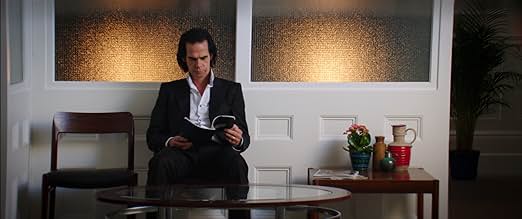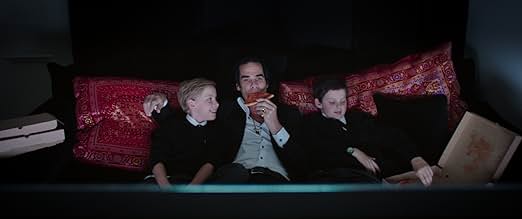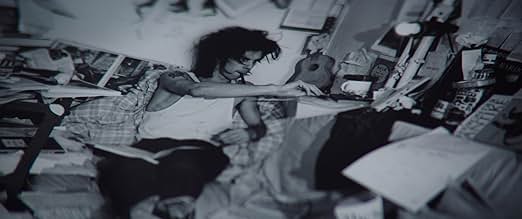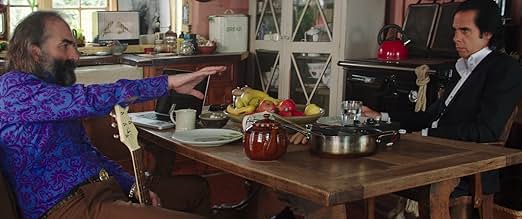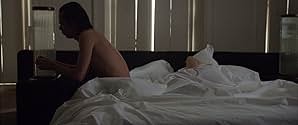- Nominated for 1 BAFTA Award
- 8 wins & 18 nominations total
Susie Bick
- Susie Cave
- (as Susie Cave)
- Directors
- Writers
- All cast & crew
- Production, box office & more at IMDbPro
Featured reviews
The only thing I've been introduced with when it comes to Nick Cave is his score for The Assassination of Jesse James by the Coward Robert Ford, which is pretty much my favorite film score ever. Such soothing, haunting, mesmerizing music. In many ways, this film is exactly like that. I always find it interesting when filmmakers play around with what a documentary really is, and this does just that. It's very melancholic in its tone, very introspective. It has fascinating examples of music being created and just how much Cave puts himself into his music, while still balancing it all and not coming off like an ego project. Even for non-fans this is recommended.
The movie had a raw feel about it, an honest look at the creative process from the perspective of Nick Cave. It opened up a line of thoughts (as an aspiring musician) that transformed, inspired, questioned and transcended my way of writing. The pace of the movie was far from slow, (though obviously nor was it fast paced), it almost reflected Cave's musical writing style, a kind of creeping epic crescendo. The movie didn't fail to completely grip my friend, who I'd rate highly in terms of his cinematic knowledge (working in the industry), despite the fact that he hasn't really been exposed to much of Cave's work.
The cinematography was beautiful, with extremely unique transitions that somehow flowed scene to scene. The soundtrack was obviously excellent, with some stirring performances, I'm fairly certain there were a few slightly teary eyes in the cinema. Nick Cave was simultaneously eccentric, enigmatic yet very down to earth and heartfelt. I did feel his heartbeat.
The cinematography was beautiful, with extremely unique transitions that somehow flowed scene to scene. The soundtrack was obviously excellent, with some stirring performances, I'm fairly certain there were a few slightly teary eyes in the cinema. Nick Cave was simultaneously eccentric, enigmatic yet very down to earth and heartfelt. I did feel his heartbeat.
Nick Cave is a very special musician. In fact musician may be the wrong descriptor.
He's a very special writer that specialises in music. He has Warren Ellis and his many collaborators to dial up the music side of the equation.
in this documentary, that looks like a movie, that, yes, he co-wrote, you find yourself immersed in the mind of a genius for an hour and a half as he discusses his life, his loves, his inspirations and his deep internal psychology in something approaching forensic detail.
He is a very beautiful man.
He talks painfully honestly at times about everything that is true to him. His 'muse' - his wife Susie who lies, back turned to camera in bed with him as the film opens.
We see half glimpses, stolen moments, of her off and on through the film but little more. We see a photo of her projected on the wall of his archivist's office.
She is as beautiful as he is.
Later we see Cave guzzle pizza with their twin sons, arm around the shoulders of one of them, devoid of comment/emotion, almost voyeuristically. It also spells L.O.V.E.
We see him kiss Warren Ellis full square on the lips as he visits his musical 'muse' on the occasion of a casual lunch of eels in black pasta. More love.
Cave carries an aura of love around with him. Yet he's often labelled with hate (partly because of the baggage of The Birthday Party have burdened him with. Grinderman, in this respect cannot help.)
We see him in the recording studio.
Gold dust. (Watching drummer Thomas Wydler as he twitches and mouths the rhythms is mesmeric.)
We see him crafting lyrics.
Gold dust. (His notebooks are works of art in their own right.)
We see him performing live.
Now, this is the thing. Anyone who has been to a Nick Cave and the Bad Seeds gig knows that no band on earth put in the same level of emotional commitment to their music; (perhaps with the exception of his faux-misogyny project Grinderman) Ellis all crazy violin fury, Cave all emotional connection.
It's this latter point that made the movie for me. He talks about how he ensnares individual audience members and then demonstrates it with a live performance of Higgs Boson Blues that reduced his female 'victim' to tears.
Me too. It was all too much. All too emotionally engrossing.
And then there's the craft...the soundtrack (obviously) the direction and the cinematography are all sublime. A special shout out has to go for editor, Jonathan Amos.
And the cameos; Kylie, Ray Winstone and Blixa Bargeld.
I'm left with a tantalising question. Is this the greatest film ever made about music?
I think it has claims on that. Notwithstanding School of Rock.
Nick Cave. {I love you man.)
He's a very special writer that specialises in music. He has Warren Ellis and his many collaborators to dial up the music side of the equation.
in this documentary, that looks like a movie, that, yes, he co-wrote, you find yourself immersed in the mind of a genius for an hour and a half as he discusses his life, his loves, his inspirations and his deep internal psychology in something approaching forensic detail.
He is a very beautiful man.
He talks painfully honestly at times about everything that is true to him. His 'muse' - his wife Susie who lies, back turned to camera in bed with him as the film opens.
We see half glimpses, stolen moments, of her off and on through the film but little more. We see a photo of her projected on the wall of his archivist's office.
She is as beautiful as he is.
Later we see Cave guzzle pizza with their twin sons, arm around the shoulders of one of them, devoid of comment/emotion, almost voyeuristically. It also spells L.O.V.E.
We see him kiss Warren Ellis full square on the lips as he visits his musical 'muse' on the occasion of a casual lunch of eels in black pasta. More love.
Cave carries an aura of love around with him. Yet he's often labelled with hate (partly because of the baggage of The Birthday Party have burdened him with. Grinderman, in this respect cannot help.)
We see him in the recording studio.
Gold dust. (Watching drummer Thomas Wydler as he twitches and mouths the rhythms is mesmeric.)
We see him crafting lyrics.
Gold dust. (His notebooks are works of art in their own right.)
We see him performing live.
Now, this is the thing. Anyone who has been to a Nick Cave and the Bad Seeds gig knows that no band on earth put in the same level of emotional commitment to their music; (perhaps with the exception of his faux-misogyny project Grinderman) Ellis all crazy violin fury, Cave all emotional connection.
It's this latter point that made the movie for me. He talks about how he ensnares individual audience members and then demonstrates it with a live performance of Higgs Boson Blues that reduced his female 'victim' to tears.
Me too. It was all too much. All too emotionally engrossing.
And then there's the craft...the soundtrack (obviously) the direction and the cinematography are all sublime. A special shout out has to go for editor, Jonathan Amos.
And the cameos; Kylie, Ray Winstone and Blixa Bargeld.
I'm left with a tantalising question. Is this the greatest film ever made about music?
I think it has claims on that. Notwithstanding School of Rock.
Nick Cave. {I love you man.)
We open with Nick Cave in bed. Soon he's half-naked before the mirror. But this semi-staged documentary is no warts-and-all exposé. The lighting is kind to Cave's boyish body, and his voice-over is as precisely prepared as it is passionate and poetic. This rehearsed vulnerability sets the tone for how directors Iain Forsyth and Jane Pollard will portray their elusive subject.
Their approach provides Cave with an appropriate level of control. Control is essential to the process of self-mythologising. Cave is aware that myth is what gives popular artists their enduring legacy. It's not dishonesty. Myth contains truth: the truth of how art (and the artist) makes us feel, the senses it triggers and the images it conjures. And what images Cave has conjured over the decades; from surreal punk, through broken Americana, through dark ballads and blaring gospel rock and a parade of delicious dirges.
The focus on the recording of Push the Sky Away means we hear very little of The Bad Seeds' earlier work. We glimpse The Birthday Party (and a very amusing vignette it is). But Cave and his myriad members have gone through various phases, and we get no sense of these because we hear nothing of them. Do not go into this film expecting a retrospective. Do not expect chronology, or even much revelation. Do not expect to bring a virginal friend and open their eyes to the strange, bleak, sentimental narratives of Brighton's finest immigrant. And yet it is a film for virtually everyone; for those harbouring an idea and a glimmer of interest in the creative method.
You'll know from the trailer that Ray Winstone and Kylie Minogue drop by for a ride in Cave's car. These scenes are more than just elaborate name-drops. They're framed as natural exchanges perhaps imagined or drawn from memory. Most moving is the conversation with ex-Bad Seed Blixa Bargeld, which has the air of some latent regret being cauterised.
Toward the beginning of the film there are a number of intense dialogues between Cave and the psychoanalyst Darian Leader. These scenes are deeply intimate and engaging, and it's a pity they fall away. It's indicative of the broader sense that 20,000 Days is truncated. Surely there's more footage. There is, surely, a three-hour edit of this movie, just as compelling and original and humorous. Yes, this is a double-edged criticism.
Elegantly shot and exquisitely edited, there's warmth in every frame of this movie, whether we're in the archives, scouring scuzzy photographs from Cave's youth, or in the pleasingly chaotic space surrounding the typewriter of dreams. Forsyth and Pollard carefully walk the line between hagiography and dehumanisation: Cave comes off as neither a fallen angel nor a mad recluse. But he does emerge an enigma. And that's okay, because that's how the man himself reckons we like our rock stars: slightly unreal, swaggering and contradictory, and bigger than God. I'm inclined to agree.
Their approach provides Cave with an appropriate level of control. Control is essential to the process of self-mythologising. Cave is aware that myth is what gives popular artists their enduring legacy. It's not dishonesty. Myth contains truth: the truth of how art (and the artist) makes us feel, the senses it triggers and the images it conjures. And what images Cave has conjured over the decades; from surreal punk, through broken Americana, through dark ballads and blaring gospel rock and a parade of delicious dirges.
The focus on the recording of Push the Sky Away means we hear very little of The Bad Seeds' earlier work. We glimpse The Birthday Party (and a very amusing vignette it is). But Cave and his myriad members have gone through various phases, and we get no sense of these because we hear nothing of them. Do not go into this film expecting a retrospective. Do not expect chronology, or even much revelation. Do not expect to bring a virginal friend and open their eyes to the strange, bleak, sentimental narratives of Brighton's finest immigrant. And yet it is a film for virtually everyone; for those harbouring an idea and a glimmer of interest in the creative method.
You'll know from the trailer that Ray Winstone and Kylie Minogue drop by for a ride in Cave's car. These scenes are more than just elaborate name-drops. They're framed as natural exchanges perhaps imagined or drawn from memory. Most moving is the conversation with ex-Bad Seed Blixa Bargeld, which has the air of some latent regret being cauterised.
Toward the beginning of the film there are a number of intense dialogues between Cave and the psychoanalyst Darian Leader. These scenes are deeply intimate and engaging, and it's a pity they fall away. It's indicative of the broader sense that 20,000 Days is truncated. Surely there's more footage. There is, surely, a three-hour edit of this movie, just as compelling and original and humorous. Yes, this is a double-edged criticism.
Elegantly shot and exquisitely edited, there's warmth in every frame of this movie, whether we're in the archives, scouring scuzzy photographs from Cave's youth, or in the pleasingly chaotic space surrounding the typewriter of dreams. Forsyth and Pollard carefully walk the line between hagiography and dehumanisation: Cave comes off as neither a fallen angel nor a mad recluse. But he does emerge an enigma. And that's okay, because that's how the man himself reckons we like our rock stars: slightly unreal, swaggering and contradictory, and bigger than God. I'm inclined to agree.
Any creative person needs to see this. Musician, writer, anything, if this film doesn't inspire you, then it will surely influence. Personally, Cave's very frank and fascinating philosophies on the creative process were stirring, moving even, especially when one of these ideas is laid out in the narration and followed by a very up close and personal live performance. Or, a ten minute, uninterrupted sequence of the band jamming out a song. It was in that latter scene you can see the conducting skills Cave possesses, as while playing the piano he is leading the band into the song's dips and crescendos. This look into the journey an idea goes on until it becomes a story, or a song in this instance, is almost intimate and extremely honest, while still managing not to spill too many beans. The unconventional nature of the film helps this aspect.
I really do think that if you write or create in any way, watch this film as soon as you can. I'm having to stop myself from going to see it again three days after i saw it. Note: this is not a documentary, but it isn't a movie either, as you'd normally think of it anyways. This film is most certainly unique, and one of the most thought provoking pieces of art that I ever ever seen, read or heard. Even his conversation with pop-singer Kylie Minogue (sp?) was interesting, as they candidly discuss different issues related to performing on a stage.
Not much action physically, but the way Cave is so spiritual about how he see and treats the creative process makes every second riveting. I didn't want it to end. For me, this was inspiring on a level that I have never felt before.
I really do think that if you write or create in any way, watch this film as soon as you can. I'm having to stop myself from going to see it again three days after i saw it. Note: this is not a documentary, but it isn't a movie either, as you'd normally think of it anyways. This film is most certainly unique, and one of the most thought provoking pieces of art that I ever ever seen, read or heard. Even his conversation with pop-singer Kylie Minogue (sp?) was interesting, as they candidly discuss different issues related to performing on a stage.
Not much action physically, but the way Cave is so spiritual about how he see and treats the creative process makes every second riveting. I didn't want it to end. For me, this was inspiring on a level that I have never felt before.
Did you know
- Crazy creditsThe credits are shown over a twilight scene of Brighton, shot from the sea.
- ConnectionsFeatures La Passion de Jeanne d'Arc (1928)
- SoundtracksCan't Get You Out of My Head
Written by Cathy Dennis and Rob Davis (as Robert Davis)
Performed by Kylie Minogue
Published by EMI Music Publishing Ltd and Universal/MCA Music Ltd
Licensed courtesy of Parlophone Records Ltd
- How long is 20,000 Days on Earth?Powered by Alexa
Details
- Release date
- Countries of origin
- Official sites
- Language
- Also known as
- 20,000 Days on Earth
- Filming locations
- Production companies
- See more company credits at IMDbPro
Box office
- Gross US & Canada
- $279,558
- Opening weekend US & Canada
- $27,879
- Sep 21, 2014
- Gross worldwide
- $2,128,486
- Runtime
- 1h 37m(97 min)
- Color
- Sound mix
- Aspect ratio
- 2.35 : 1
Contribute to this page
Suggest an edit or add missing content



